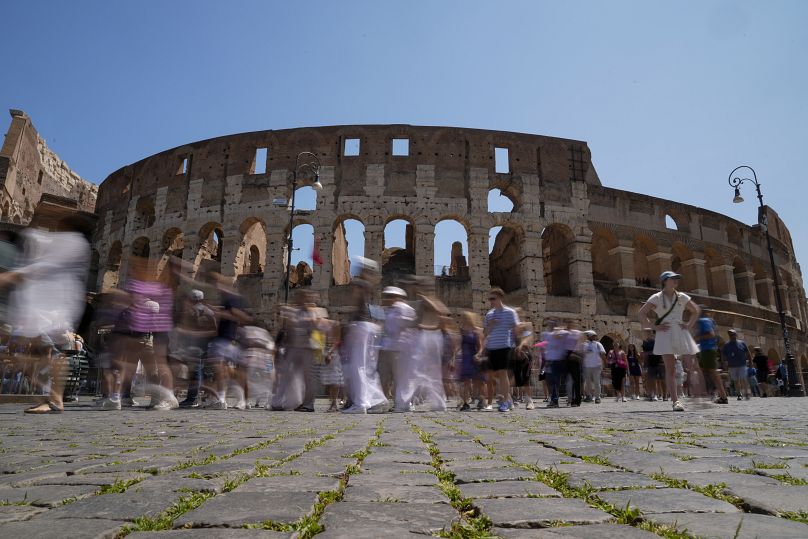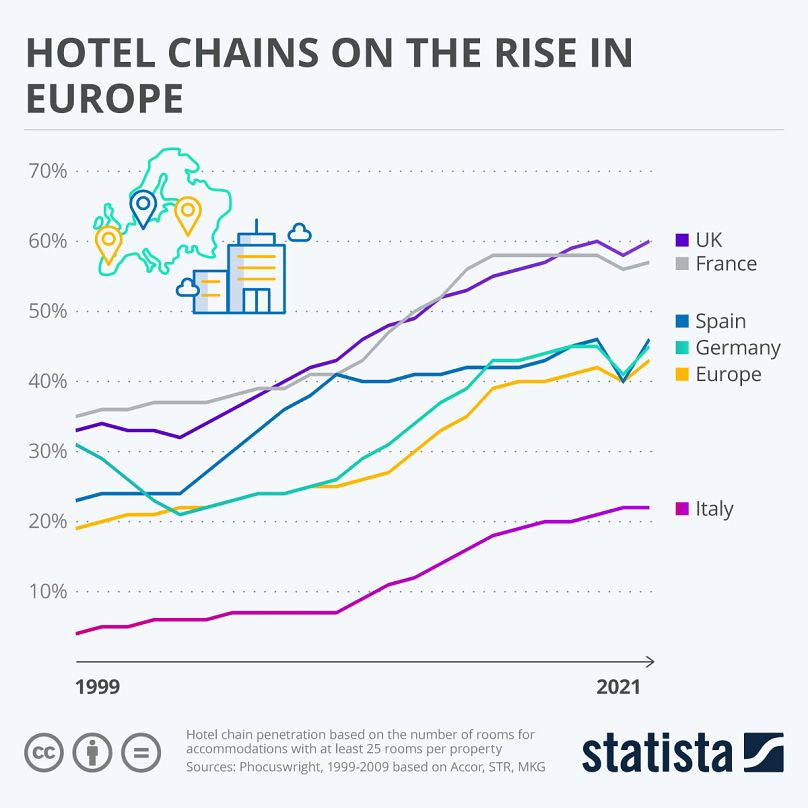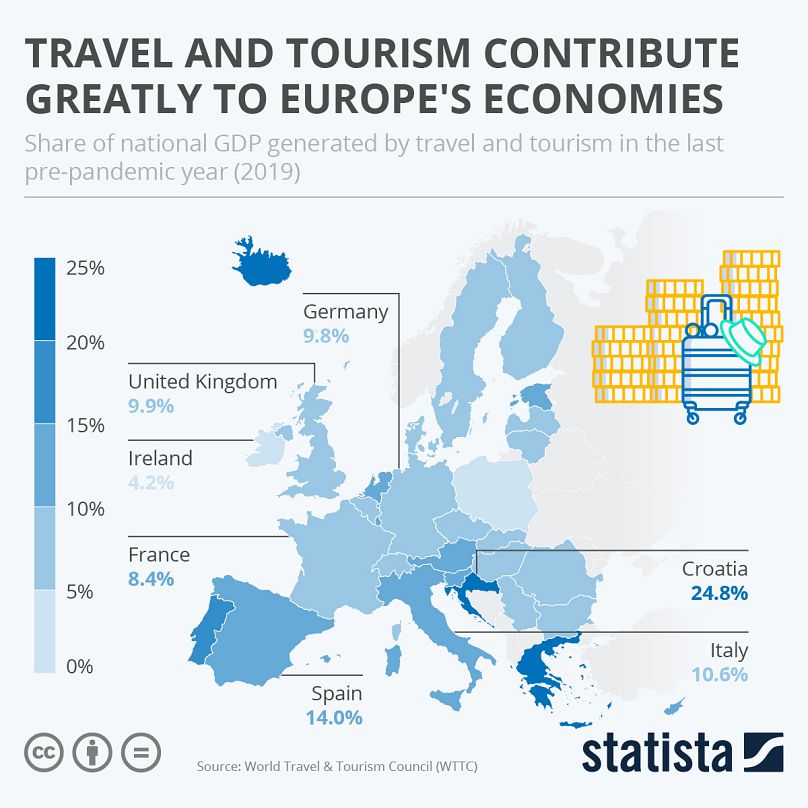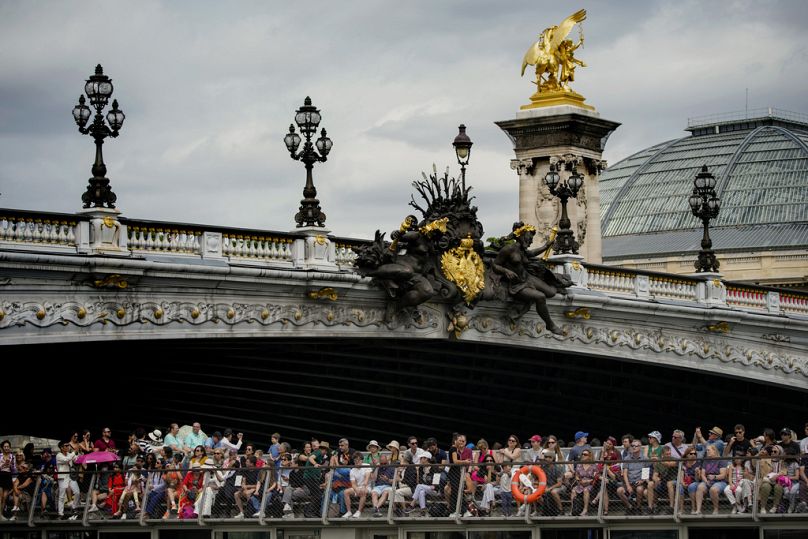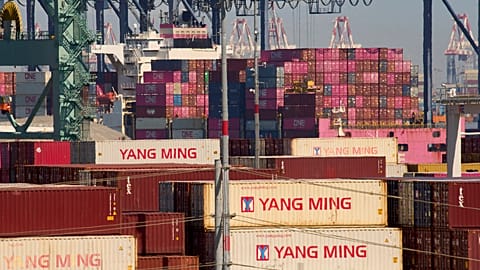The continent's local establishments are in a steady state of decline, and the continent's rich cultural diversity in travel and tourism is giving way to chainification, Peter Lochbihler writes.
A lot has been written lately about Europe falling behind economically, in particular in relation to the US and China.
But there is one sector where there is no doubt that Europe remains the global leader: travel and tourism.
Europe accounts for almost two-thirds of the world’s tourist arrivals, with travellers from every corner of the world making their way to the continent every year.
The continent's local heritage is in peril
Europe’s allure lies in its rich tapestry of cultures and people. This diversity finds its reflection in the fabric of Europe's travel industry, which comprises a multitude of small, locally-owned businesses.
An astounding 77% of European hotels are independently owned, with many of them being multi-generational family businesses.
They are the heart and soul of the European tourism industry. Their unique character, reflecting local heritage, provides the backdrop for many memories made and Instagram snapshots taken.
While Europe can rightly be proud of its world-leading tourism sector, not all is well.
What is rarely talked about is that Europe’s small and independent businesses are in a steady state of decline.
Local establishments are slowly being replaced by larger, often global brands. Europe’s rich cultural diversity in travel and tourism is giving way to chainification.
Meanwhile, hotel chains are pouncing on the opportunity
The underlying reason for this shift is the growing number of international visitors to Europe.
Smaller businesses find it increasingly challenging to reach travellers who are unfamiliar with the destination or face language barriers.
In contrast, major hotel chains possess the resources to establish a global presence, cultivate customer loyalty, and distribute marketing costs across a larger customer base.
This structural disadvantage places independent properties in a precarious position, and Europe is now experiencing the consequences of its own success.
The COVID-19 pandemic has further exacerbated this trend, leaving smaller businesses even more vulnerable and ill-equipped to compete effectively.
As a result, almost two-thirds of the investments in the European accommodation sector are now done by hotel chains, with just four companies building half of Europe’s new hotels.
If this trend continues, the face of Europe’s travel sector will change fundamentally.
Investment costs too high, know-how lacking
So what can we do to preserve Europe’s unique diversity in travel and tourism? How can we best support and empower Europe’s small businesses?
At Booking.com, we partner with hundreds of thousands of small accommodations. We pride ourselves on a business model tailored to support small and independent properties, helping them to be better visible to travellers from near and far in a cost-effective and risk-free manner.
Smaller accommodations struggle, in particular, with making the required investments to remain competitive in an evolving marketplace.
For instance, there is a growing demand for sustainable travel and tourism. Yet, despite a lot of efforts by governments to support sustainability measures, small businesses find it very difficult to make the transition.
According to our semi-annual European Accommodation Barometer, the leading blockers are too high investment costs and a lack of know-how.
Correspondingly, more fiscal and tax incentives, better access to capital and financing, and more technical and operational support top the list of desired support measures from governments.
One size does not fit all
Governments should listen to small businesses and rethink their approaches. The current support model is not working.
Likewise, industry leaders need to be more responsive. At Booking.com, for example, we have developed a travel sustainable program that accounts for the dynamic nature of small accommodations, makes their efforts visible to travellers, and helps them to become more sustainable one step at a time.
We need to recognise that there cannot be a one-size fits all approach in an industry that is highly diverse.
Europe's leadership in travel and tourism is founded upon its ecosystem of small and independent businesses.
Let us ensure that they have the right environment to continue to thrive in the future.
Peter Lochbihler is the Global Head of Public Affairs at Booking.com.
At Euronews, we believe all views matter. Contact us at view@euronews.com to send pitches or submissions and be part of the conversation.
















